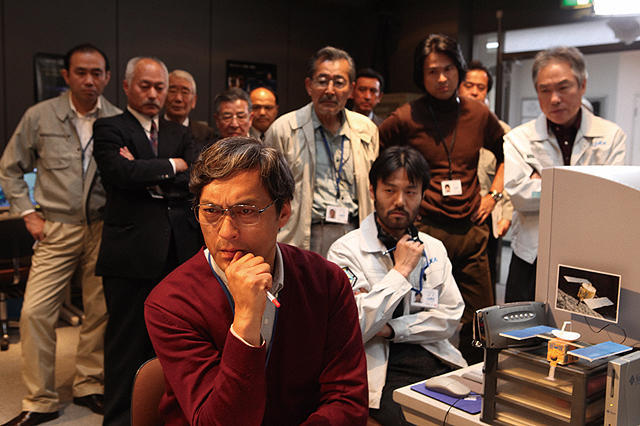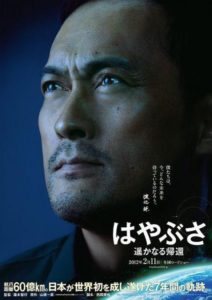One of three films released in the last year on the long journey of a Japanese space probe, a fine cast and a solid script distinguish this one from the growing crowd.
[stextbox id=”grey” caption=”Hayabusa: The Long Voyage (2012)” float=”true” align=”right” width=”200″]
Director: Tomoyuki Takamoto
Writer(s): Takuya Nishioka
Runtime: 136 minutes
Starring: Ken Watanabe, Yosuke Eguchi, Yui Natsukawa
Distributor: Toei
Country: Japan
Rating: Worth A Look (?)
[/stextbox]
In May 2003, the Japan Aerospace Exploration Agency (or JAXA) launched an unmanned spacecraft of their own development to retrieve samples from an asteroid. Seven long years later, Hayabusa achieved its goal and was the first of any kind of craft launched from Earth to safely return samples of this kind to home base. The story was one of such great national pride for Japan, and in the wake of the tsunami and resulting tragedies in Japan it’s strong nationalistic message became the subject of no less than three rival films. Yukihiko Tsutsumi’s high-profile effort, simply titled Hayabusa (2011) starred the incomparable Toshiyuki Nishida. Most recently, Welcome Home, Hayabusa (2012) was released to Japanese audiences. Slipping in between those two was Hayabusa: The Long Voyage Home, concentrating on the people on the ground who helped return the probe safely.
Junichiro Kawaguchi (Ken Watanabe) is in charge of the Hayabusa mission at JAXA, what the Americans refer to as Japan’s “Marilyn Monroe in rags”. On a comparatively shoestring budget, the group have managed to cobble together a Japanese probe dedicated to returning samples from asteroid 25143 Itokawa. However, as the probe approaches its target, problems begin to arise starting the Earth-based crew on a journey that will take them almost a decade to see the end of.
Unlike the previous Welcome Hone, Hayabusa, which concentrated on ion engine designer Kento Ohashi and his family, Hayabusa: The Long Voyage Home takes more of a procedural approach to the story, encompassing as many characters as possible. To this end, our way into the potentially dry world of rocket science is via the character of reporter Mari Inoue (Yui Natsukawa), an initially green young journalist keen for her first big story. As the mainstream press begins to lose interest in the story, due to constant delays and a lack of immediate results, her character slowly becomes sidelined. This is just fine, thanks to the presence of the film’s biggest drawcard Watanabe and Yosuke Eguchi, both capable leading men in their own right. They take what could have been two-dimensional characters spouting techno-babble, and craft them into something a little more rounded.
The film conveys the sense of the passing of time effectively, and at almost 2 hours and 20 minutes only occasionally succumbs to the tedium of accuracy over dramatic tension. Indeed, veteran screenwriter Takuya Nishioka weaves a fabric around the handful of characters that all have small but significant roles within the success of the mission, from the ion engineer to the elderly mechanic who had made parts for Hayabusa‘s collectors. Combined with the various twists and turns and problems that arose in the probe’s mission, Nishioka finds the natural tension in the story and lets them play out on a grand and micro scale. It may be obvious jingoism in the wake of a national tragedy, but Hayabusa: The Long Voyage Home stands out thanks to solid acting at its core.
Hayabusa: The Long Voyage Home was released in Japan on 11 February 2012.





